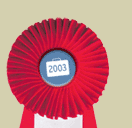 |
 |
|||||

This is an awards book, so it's time for some backslapping
Some of the smartest people in Canada work in the ad biz. This is lamentable when you look at the calibre of our politicians, or the state of CanLit (although at least one of this year's judges confessed to be working on a novel), but it does make for some great TV viewing or newspaper reading.
A few of the year's best campaigns were smart in a clever way. Quebecers got a treat when they opened Le Devoir and saw Bos' ads for men's clothier Henri Vézina, which, the agency claims, were designed to answer that "famous question first raised on Johnny Carson: exactly what do newscasters, talk-show hosts and politicians wear on the parts of their bodies out of view of the camera?" The campaign was original, funny and admirably opportunistic.
Other campaigns were smart at a breakthough level. Canadians across the country got a shock when Palmer Jarvis DDB broke the Relax, It's Just a Game campaign for the Canadian Hockey Association. Four out of 12 judges put this among their top three favourite ads, and three particularly liked the image of a young girl pushing for a fight after two grocery carts collide in the frozen foods aisle.
Some notable print campaigns were aesthetically ingenious, like Rethink's stunning Clover Leaf ads, or Palmer Jarvis' visual ideas for Knorr. The sales impulse dulls the beauty of the ads not at all.
This competition is particularly inclined to reward smart advertising. Campaigns have to be strong enough to impress both a creative panel of judges, and a strategic panel of marketing executives. This year many of the creative judges claimed to award scores based on strategic insights, but the difference in creative and strategic scores belies their intentions.
Creative judges selected Taxi's Mini or Palmer Jarvis' ICBC work as their favourite campaigns. Two of the strategic judges, on the other hand, chose John St.'s Scottowels campaign, which put 250,000 paper towels in the December issue of Canadian House and Home and caused a leap in growth for the client.
Taxi won again, and there's no mystery as to how they did it. The agency puts a premium on its people, and trusts them to do great creative work using strong strategic insights. "The right way to do it is to put the right number of people in a room and make them accountable for the results," agency head Paul Lavoie once said. Taxi - the shop that takes its name from the idea that the best ideas are created by as many people as can comfortably fit in a taxi - is now in the running to make Deloitte and Touche's annual list of Canada's 50 Best Managed Companies next year, and they stand a good chance.
Palmer Jarvis, which won the highest score from the strategic panel, comes in at number two, with sister agency Downtown Partners DDB close behind. Nobody would have a chance if the two shops competed as one, we reasoned, and we were more right than we thought.
Two newcomers joined the competition this year. Neither John St. nor Bos broke the winners' circle, but their nomination makes it clear that both have joined the ranks of notable agencies in Canada. If the competition were based on strategic scores alone, John St. would have earned silver - no small feat for an upstart that often eludes awards shows by attributing all creative to the agency rather than the individuals who work for it.
Maybe this is a business model we'll be taking a closer look at next year.
Sara Minogue
special reports editor

